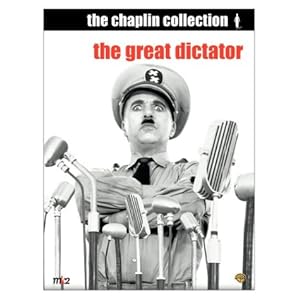
It wasn't easy finding this one. There's something very off about the opening of The Great Dictator, and it took me a few minutes to figure out. If you don't know, it's Charlie Chaplin's first full sound film, and it mocks Hitler and the Nazi party. It starts off with Chaplin playing a soldier in a battle during World War I, fighting for the fictional Tomainian side, which takes the place of Germany in the movie. It's all pretty typical Chaplin gags, but something is just wrong. And then I noticed - though there are plenty of sound effects going on, and even a few lines from Chaplin himself, there's no music. Silent movies just seem wrong without music constantly playing in the background, and it makes the whole opening seem weird. The scene ends with Chaplin and another soldier crashing a plane and him getting amnesia, which transitions the movie to the real story and fixes the issue, as it becomes more of a normal sound movie and brings back the soundtrack.
It's still a bit weird though, a movie with the soul of a silent film playing with a sound film's toys. I wouldn't want it to have been silent though, because the funniest part of the movie is probably Chaplin's impression of Hitler. "Adenoid Hynkel" is the dictator of Tomainia, and though he speaks English in most normal scenes, whenever he's giving a speech or gets too angry, he starts speaking a German-sounding gibberish that matches Adolf's mannerisms without actually make a lick of sense. A few words familiar to English speakers will slip in, but otherwise it's all just vocal performance, much like the musical number from near the end of Modern Times. There's plenty of other stuff in the movie, as Chaplin bounces between the roles of evil dictator and a Jewish barber who at first doesn't quite understand why the police seem to hate him so much.
It also features his Modern Times costar and real-life wife Paulette Goddard as the requisite love interest and Jack Oakie as a stand-in for Mussolini, who he has some amusing back-and-forth with. Eventually the movie decides it should have a plot, and the barber and his friends make an attempt to get rid of their oppressive government from within. It ends with the barber giving a rousing speech, a complete triumph of orating that I wasn't really expecting from a man most famous for never speaking. The words are a bit over the top, but he means them, and it was an interesting way to end a mostly solid movie. It's not my favorite work by Chaplin, but it ended up being a lot better than the beginning led me to believe it might be.
AAAAAGGGHHHH
16 years ago


































No comments:
Post a Comment